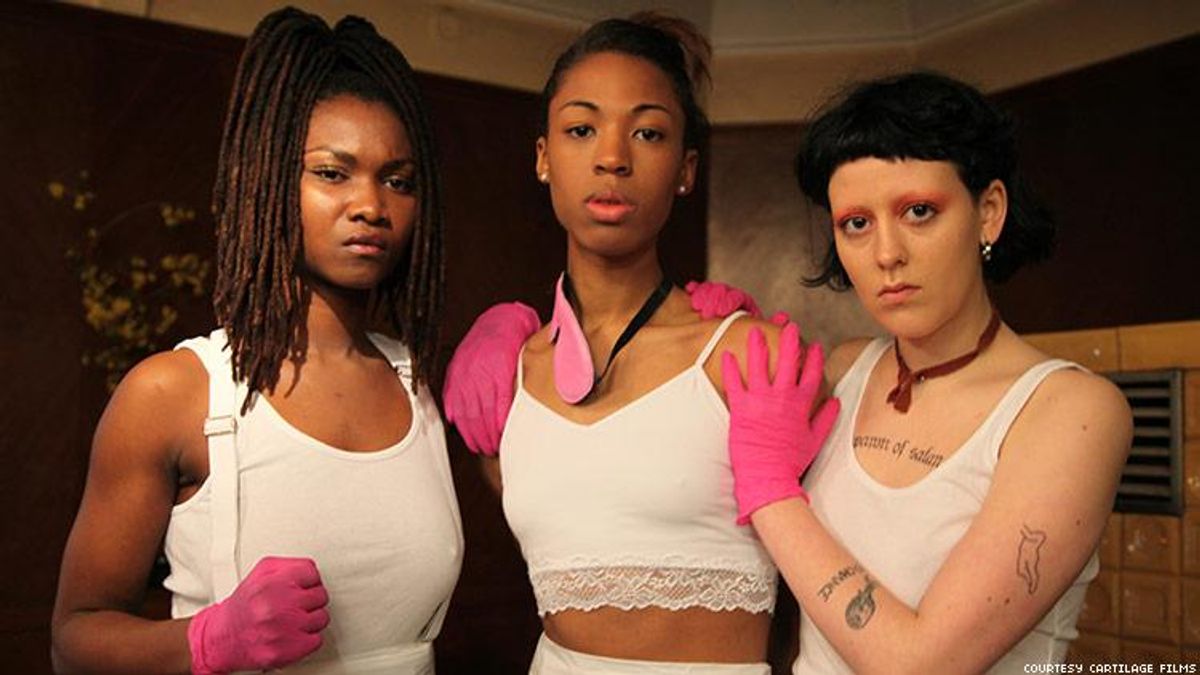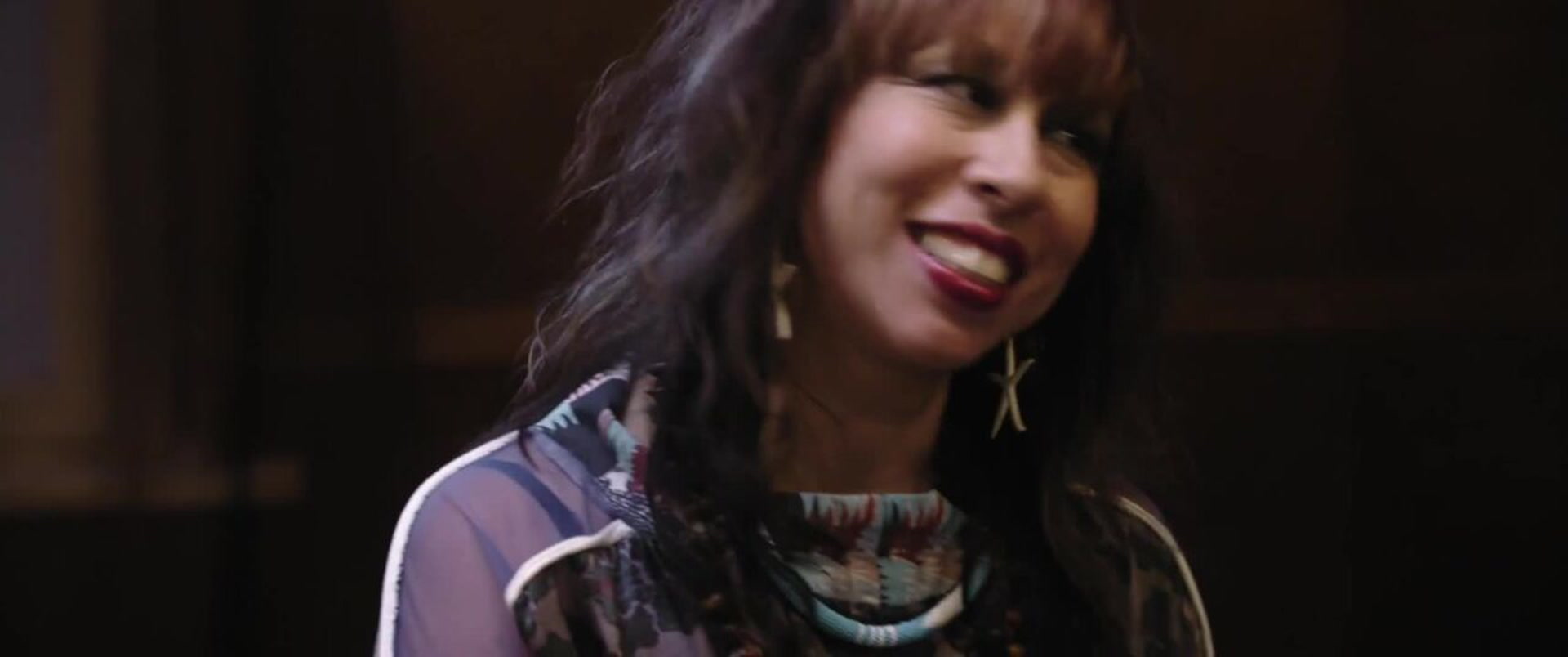Above, from left: Actresses Victoire Laly, Kita Updike, and Serenity Rosa in a scene from The Misandrists.
For the record, Bruce LaBruce has nothing against feminists -- he even is one -- but that doesn't keep him from lampooning them in his latest film, The Misandrists.
"I'm a certain stripe of feminist," says the iconoclastic gay filmmaker, who in The Misandrists, which he wrote and directed, creates a lesbian-separatist feminist terrorist group, the Female Liberation Army, out to change the world.
Its mission is complicated, however, when one of the members comes across a male revolutionary who's been wounded and clandestinely moves him into the group's headquarters, in defiance of the rules. His presence is one of the many secrets that will ultimately be revealed as the plot unfolds.
The Misandrists is in some ways a lesbian sequel to The Raspberry Reich, LaBruce's 2004 film in which the leader of a militant group persuades her young male followers, mostly straight, to have sex with each other in resistance to society's norm of heterosexual monogamy. It has the same star, Susanne Sachsse, again in a leadership role, this time playing Big Mother, the head of the FLA. It has echoes of several other movies as well, including The Beguiled, the 1971 film, remade last year, about a wounded Union soldier taken in at a Southern girls' school during the Civil War.
It also has the campy humor and B-movie tropes -- sexploitation, revenge, etc. -- LaBruce is known for, plus many sexual couplings, mostly between women, and one shockingly violent scene. Despite that grisly moment, in the end the film seems to send the message that love (and sex) will conquer the world.
But why critique feminism right now, when there are so many harmful things in the world to critique? "It's also a critique of any extremist kind of movement -- both on the left and right," says LaBruce. Some political movements, even on the left, have a tendency to ignore civil liberties, he says. In The Misandrists, this tendency is personified by Big Mother, who's a strong, formidable character, but a dictator as well, he notes.
"You have to be really wary of that" in both liberal and conservative movements, and "somehow the extreme right and the extreme left end up meeting," he says. He adds, though, that he's "definitely appalled by the tide of conservatism that's sweeping the world."
The Misandrists, he continues, critiques specific aspects of second-wave feminism -- the ones he has problems with, such as antiporn activism and transgender exclusion. He tried to balance an understanding of where essentialist feminists are coming from with the need to accept trans people for who they are, he says, though the film "definitely comes down on the side of transgender inclusion." (No spoilers on just how that plays out.)
In some ways, The Misandrists was a response to demand from some of his lesbian friends, who complained that there weren't lesbian characters in his "sexual revolution" film, The Raspberry Reich. "So I was always out to make a film about extreme feminist lesbian terrorists," he says.
But The Misandrists hasn't pleased all of its feminist or lesbian viewers. LaBruce has gotten some challenging questions when the film has played at festivals; one woman in Europe asked him, "Do you really thing that making a film that presents every cliche about lesbians imaginable could be considered a feminist film?" His response, in part, is that the B-movie elements he loves are inherently cliched -- over-the-top characters, outsize emotions.
Being a misandrist, meaning man-hater, is kind of the ultimate lesbian cliche, he admits, but he also wanted to make audiences more familiar with the word. Everyone knows the word for woman-hater, misogynist, so it was "time to make a point and turn the tables a bit," he says.
He adds that he has a history with feminism and with lesbians -- he was immersed in feminist studies while attending college in the 1980s, worked with lesbians and feminists on a radical film criticism magazine, and hung out with lesbian separatists in San Francisco in his younger days.
Separatism "is a kind of militancy that I understand," he says, noting that some gay men in the early days of the movement had separatist tendencies too, although he favored solidarity between genders. Separatism, he says, is common in nascent political movements, but "there's a lot more reason to be inclusionary at this point."
With women's rage against sexual harassment and assault, and sexist discrimination in general, at a fever pitch in 2018, The Misandrists might seem "zeitgeisty," LaBruce says, but he wrote the script three years ago, and he had been thinking about the film's concept for years before that.
"It wasn't something that I thought, Oh, this'll be really topical right now ... it's an idea that's been germinating for quite a long time, since I made my film The Raspberry Reich," he says.
Another motivation for making The Misandrists, he says, is that for some time he had wanted to make a film with a mostly female cast. Most of the crew members were women as well. On location in Germany, in a remote spot about two hours from Berlin, "there was a lot of really strong bonding going on" among the women, he says.
"A lot of the women in the cast said they'd never had that experience before," of working on a set populated mostly by women," he says. "There were a lot of political discussions, a lot of mentoring going on."
LaBruce has been surprised and gratified by the wide distribution of The Misandrists; it's played at festivals in some unlikely places like Moscow and Istanbul, and distributor Cartilage Films is releasing it in about 25 U.S. cities in the coming month. He attended a lot of the festival screenings, but he's also busy with other projects, such as short erotic films, and he's planning his next feature, Saint-Narcisse, which he describes as a modern retelling of the Narcissus myth. Considering a certain leader of the free world, that's another project that sounds very zeitgeisty.

Bruce LaBruce
Watch a clip of the film below.
The Misandrists opens today at the Village East Cinema in New York City and June 1 at the Landmark Nuart Theatre in Los Angeles. During June and July it will screen in more than 20 other U.S. cities, including San Francisco, San Diego, New Orleans, Minneapolis, Dallas, Houston, Atlanta, and Washington, D.C. Find theater information and more about the film here.




















































































Here's our dream all-queer cast for 'The White Lotus' season 4